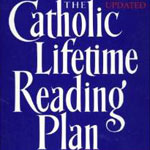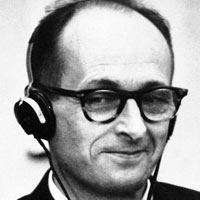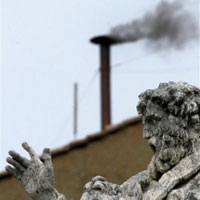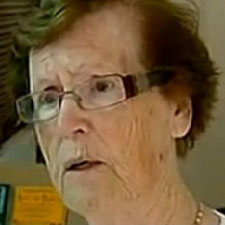Why, an astute readers asks, does Fr John Hardon nominate A Handful of Dust as one of Evelyn Waugh’s specially recommended works?
This is a good question, especially since Waugh’s later, explicitly Catholic Sword of Honour trilogy, is not included in Hardon’s Catholic Lifetime Reading Plan. What’s going on here?
First, I think it’s fair to consider what Fr Hardon has to say about Evelyn Waugh. My copy of The Catholic Lifetime Reading Plan finally arrived, and I think everybody should track down a copy. It is so much more than a list of books, as I think his treatment of Waugh shows. Fr Hardon writes:
Most of Evelyn Waugh’s writing was done after his conversion in 1930. By his own estimate, Brideshead Revisited is his best book. This is the story of a great British Catholic family through the decades between the two world wars. When critics found fault with the novel’s strong religious atmosphere, Waugh admitted that some people would be outraged “at God being introduced into my story. I believe you can only leave God out by making your characters pure abstractions.” Modern novelists “try to represent the whole human mind and soul, and yet omit its determining character — that of being God’s creature with a defined purpose. So in my future books there will be two things to make them unpopular: a preoccupation with style; and the attempt to represent man more fully — which to me means only one thing, man in his relation to God.”
Fr Hardon then turns his attention to Waugh’s biographies, which are nearly as good as his novels, before concluding:
Evelyn Waugh’s writings reveal an author who had a deep sense of history. But he also had keen foresight. His books show every promise of being ‘relevant’ beyond the twentieth century.
Specially recommended:
- Brideshead Revisited
- A Handful of Dust
- Edmund Campion
It’s perhaps worth noting that although Waugh considered Brideshead Revisited his masterpiece for several decades, in his final years he was embarrassed by its excess, and settled on Helena as his greatest novel.
Helena is an historical novel, focused on St Helen, the mother of Emperor Constantine. Helen was no mystic, and was afflicted with the sort of character defects and bad habits which Waugh identified in himself (and which you and I see too, when we gaze at the proverbial mirror). But Helen is a canonised saint because of her work in the Holy Land. She devoted much or her life, and her wealth, locating the places which were significant in the life of Christ, and recovering relics like the true cross. Helen’s was a “practical faith,” which recognised that Christianity is incarnational. Helena an interesting study of sacramentality and holiness. But it’s not as good as Brideshead, or Sword of Honour, or A Handful of Dust, so not many people share Waugh’s appraisal that it’s his masterpiece.
Back to Fr Hardon’s appraisal. It’s good to remember that his Catholic Lifetime Reading Plan includes a comprehensive biography, which includes all the works in print and in English written by the 104 authors he profiles. So the book list I have prepared, which derives from Fr Hardon’s Reading Plan, is not only minimalist, but also arbitrary — perhaps unfairly so. Fr Hardon’s list is really a list of authors whom he writes about, not book titles.
It’s telling that his entry on Waugh is so focused on the religiosity of Waugh’s novels. It’s no wonder he “specially recommends” Brideshead Revisited. I’m very surprised Fr Hardon does not include the Sword of Honour trilogy, which in some ways is a more successful study of “man in his relation to God.”
But apart from all that, why does Fr Hardon include A Handful of Dust in a Catholic reading plan? My theory is this: although A Handful of Dust is not explicitly Christian, and really a study of humanism, not religion, it is nonetheless a brilliant and profound study of morality. I didn’t mention this in my previous post because you can’t mention everything, but this is one of the book’s greatest strengths. Indeed, this is part of Waugh’s unique genius. But that’s another post. Maybe for tomorrow.






Hello to all!
I read in my book Finding God Traces something about Edmund Campion
There is moment in all religions when the present falls away and you are standing in eternity. The Catherals and everything else exist for that moment, to make it possible-
Edmund Campion, A Place in the City
http://en.wikipedia.org/wiki/Edmund_Campion
John Hardon started out as a true priest and adorer of the Eucharist. Finished up as a heretic and idolater. A pity he didn’t spend time reading Quo Primum by Pope Saint Pius V instead of soul -destroying novels.
Edmund Campion died rather than get involved with false priesthoods.
I don’t normally assist schismatics, PriestDefender, but you might recall the old aphorism, “You catch more flies with honey than with vinegar.”
Is that the best you can do? Indeed, no more Padre Pio’s or John Vianney’s – in other words no one to help us do the most important business this side of the grave which is to have our sins forgiven. Neither you or your “pope” have power or authority to do this. Remember, we are talking about the most important business. More important than any business we can do for our bodies.
Time for you to do some serious study and soul-searching. After all, you hardly want to die as a mocker of Our Lord’s one holy Catholic priesthood.
I have read the spiritual definition of schism is a rupture of charity. The poster on this thread attacking the reputation of Fr Hardon – and similar viciousness displayed typically by schismatics – confirms it.
Great post Father, I personally didn’t pick up on how precisely you were mocking Our Lord or His Priesthood, so I thought it was fine.
I read Brideshead last year and loved it. Fr James Kerr gave me about 15 of Waughs books but I stupidly gave them away before reading them, and now they’re terribly hard to find!
I’m not too worried that it’s been recommended by you or Fr Hardon, given that even were you both schismatic, Evelyn Waugh wasn’t… Or was he? When did the Pope become our ‘pope’? It’s so hard to keep track.
Cheers fr
Dear Father,
I came upon this by chance. A really great article and interesting to read. Shame some of the people commenting are obviously total nutters. I read a Handful of Dust and many other of Waugh’s novel’s years ago and enjoyed them immensely eventhough I wasn’t a Catholic then. When I was in the US I met people who had been friends and associates of Fr Hardon and they all revered him greatly.